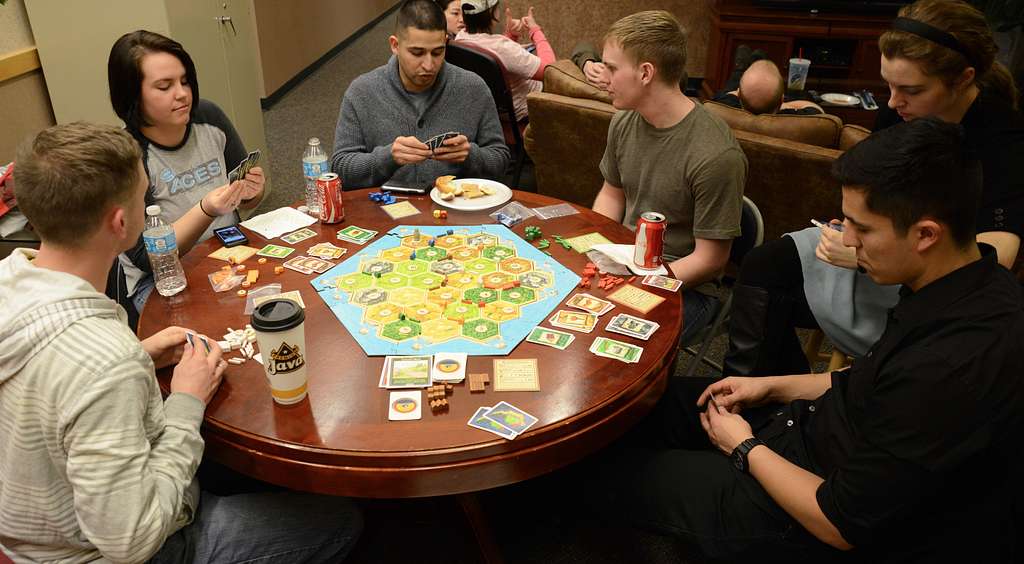Board games offer a wide array of mechanics that define their gameplay and strategic depth. Understanding these mechanics can enhance your gaming experience and help you choose the right games for your collection. In this post, we’ll explore four key game mechanics: engine builders, worker placement, deck builders, and tile placement. We’ll also provide examples of games that exemplify each mechanic.
Engine Builders
Engine building is a game mechanic where players gradually construct a system or “engine” that generates resources or points more efficiently as the game progresses. The core idea is to start with minimal resources or capabilities and build a complex and efficient system over time. Players make decisions to enhance their engine, aiming for exponential growth and optimization.
In engine builders, the challenge lies in identifying synergies between different components and making strategic choices that lead to a powerful and efficient engine. This mechanic often involves a combination of resource management, card drafting, and strategic planning. Players must carefully balance short-term gains with long-term growth, creating a dynamic and engaging gameplay experience.
Games featuring engine building:
- Terraforming Mars: Players develop their corporations’ abilities to terraform Mars through card play and resource management.
- Race for the Galaxy: A card game where players build space civilizations by developing technologies and settling planets.
- Wingspan: Players build bird habitats, each card adding to their engine to generate food, lay eggs, and draw cards.
- Splendor: Players collect gems to purchase development cards, creating an engine that generates more resources and points.
Worker Placement
Worker placement is a mechanic where players assign a limited number of workers to various action spaces on the board to perform specific tasks. Each space typically offers unique benefits, such as collecting resources, building structures, or gaining special abilities. The key aspect of this mechanic is that once a space is occupied, it usually cannot be used by other players during that round.
This mechanic emphasizes strategic planning and resource management. Players must decide the optimal placement of their workers to maximize their benefits while anticipating and countering opponents’ moves. Worker placement games often involve a high degree of interaction and competition, as players vie for valuable spaces and resources.
Games featuring worker placement:
- Agricola: Players manage a farm, placing workers to gather resources, build structures, and expand their family.
- Viticulture: Players manage a vineyard, placing workers to plant vines, harvest grapes, and produce wine.
- Stone Age: Players send workers to gather resources, develop tools, and build structures in a prehistoric setting.
- Lords of Waterdeep: Players take on the roles of secret lords, placing agents to recruit adventurers and complete quests.
Deck Builders
Deck building is a mechanic where players start with a small, weak deck of cards and gradually acquire more powerful cards to add to their deck. Throughout the game, players draw cards from their personal deck to perform actions, acquire new cards, and refine their deck’s composition. The goal is to create a highly efficient deck that maximizes the potential of each draw.
Deck builders emphasize strategic planning and optimization. Players must make careful decisions about which cards to acquire and how to balance their deck. This mechanic often involves a dynamic progression, as players’ decks evolve and become more powerful over the course of the game. Deck building offers a satisfying sense of growth and customization.
Games featuring deck building:
- Dominion: The quintessential deck-building game where players acquire cards to build their deck and earn victory points.
- Clank!: Players build decks to delve into a dungeon, acquiring treasures and avoiding the dragon’s wrath.
- Ascension: Players build decks to defeat monsters and acquire powerful constructs and heroes.
- Star Realms: A space-themed deck builder where players build fleets and bases to battle each other.
Tile Placement
Tile placement is a mechanic where players place tiles on a board to create patterns, complete areas, or achieve specific goals. Each tile typically has different attributes or features that affect how it can be placed and its impact on the game state. The challenge lies in strategically placing tiles to maximize their benefits and minimize opponents’ opportunities.
This mechanic involves spatial awareness, strategic planning, and often a degree of tactical adaptation. Players must consider both immediate and long-term implications of their tile placements. Tile placement games can range from simple and abstract to complex and thematic, offering diverse and engaging gameplay experiences.
Games featuring tile placement:
- Carcassonne: Players place tiles to build cities, roads, and fields, earning points for completed features.
- Betrayal at House on the Hill: Players explore a haunted house by placing room tiles, with each game creating a unique layout.
- Castles of Mad King Ludwig: Players place room tiles to construct eccentric castles, balancing functionality and aesthetics.
- Isle of Skye: Players place landscape tiles to build their own territory, competing for various scoring conditions.
Conclusion
Understanding these essential board game mechanics—engine builders, worker placement, deck builders, and tile placement—can greatly enhance your appreciation and enjoyment of board games. Each mechanic offers unique challenges and strategic depth, catering to different play styles and preferences. Whether you’re building powerful engines, strategically placing workers, crafting efficient decks, or creatively arranging tiles, there’s a game mechanic for every board game enthusiast.
Adding games that exemplify these mechanics to your collection can provide a diverse and enriching gaming experience. Explore the games listed above and discover the joy and excitement that each mechanic brings to the tabletop. Happy gaming!


Leave a Reply